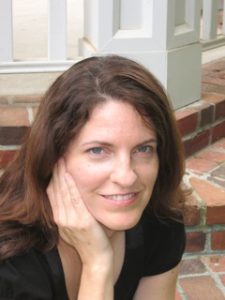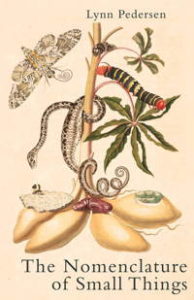 LYNN PEDERSEN is the author of The Nomenclature of Small Things (Carnegie Mellon University Press Poetry Series), Theories of Rain (Main Street Rag’s Editor’s Choice Chapbook Series), and Tiktaalik, Adieu (Finishing Line Press New Women’s Voices Chapbook Series). Her poems, essays, and reviews have appeared in New England Review, Ecotone, Southern Poetry Review, Slipstream, Borderlands, Poet Lore, and Heron Tree. She is a playwright and member of the Dramatists Guild of America. A graduate of the Vermont College of Fine Arts, she lives in Atlanta, Georgia. Find her online at www.lynnpedersen.com. LYNN PEDERSEN is the author of The Nomenclature of Small Things (Carnegie Mellon University Press Poetry Series), Theories of Rain (Main Street Rag’s Editor’s Choice Chapbook Series), and Tiktaalik, Adieu (Finishing Line Press New Women’s Voices Chapbook Series). Her poems, essays, and reviews have appeared in New England Review, Ecotone, Southern Poetry Review, Slipstream, Borderlands, Poet Lore, and Heron Tree. She is a playwright and member of the Dramatists Guild of America. A graduate of the Vermont College of Fine Arts, she lives in Atlanta, Georgia. Find her online at www.lynnpedersen.com. |
 Book Title, Press, Year of Publication:
Book Title, Press, Year of Publication:
The Nomenclature of Small Things, Carnegie Mellon University Press, 2016
Synopsis: The Nomenclature of Small Things explores the grief of pregnancy loss in the context of science and evolution. The book is structured in a series of catalogs that interweave personal narrative with scientific inquiry by Charles Darwin, Carl Linnaeus, Robert Hooke, Isaac Newton, Alexander Wilson, and Luke Howard.
What do you think makes your book (or any book) a “project book”?
I started with an idea, a plan, a subject. A project book has a focus or unifying structure, and grief is central to every poem in Nomenclature. Science is also a unifying theme, and it works on several levels—as metaphor, content, and organizing principle.
Why this subject (or constraint)?
I was interested in the patterns of grief I recognized during years of fertility issues, and I felt compelled to relay those experiences—though there isn’t a good vocabulary for grief in today’s English language.
The controlling hypothesis or goal—if I can call it that—was to see if the language of science could be used as a filter for grief and a stand-in for what can’t be named or expressed. I was haunted by the questions “Why did this happen?” and “How can I keep this from happening again?” Nomenclature does not dwell in the present or the immediate past. Instead, geologic time in the book moves from the Precambrian to the Anthropocene.
Are you comfortable with the term “project book”?
I don’t mind the term “project book,” but it sounds too organized. The process was messy and uncertain, and I would not want to imply that I had all of the structure and turns in the book figured out early on in the writing.
Was your project defined before you started writing? To what degree did it develop organically as you added poems?
I had an initial starting point (grief and science), but the project took on a life of its own. Most surprising to me was discovering how the form and topics of the poems changed as the book progressed. The first poems were narrative grief poems written in first person. Each poem led to more questions or more research, and I moved on to science poems as a second phase. Those science poems were written in second and third person—some in prose form. I did not realize at the outset the extent to which the logic and structure of science would be necessary as a buffer to the emotional content of the poems (“The Infinite Density of Grief”). Nomenclature was the last topic I worked on. These three narrative threads—obsessions really—weave throughout the book.
Did you allow yourself to break your own rules?
Grief is a broad category, and I didn’t make any strict rules about what I would or wouldn’t include. It was important, however, to recognize that poems that fell outside my initial scope were not anomalies but exactly what the book needed for its structure and tone. There were only so many narrative grief poems I could write (and that a reader could stand to read). Some other voice or perspective had to step in to carry the book, and in this case it was science.
Darwin is a recurring figure. Every few months as I was writing, a new Darwin poem would emerge: “Something About Darwin,” “On Reading About the Illness and Death of Darwin’s Daughter Annie,” and “I Hate Darwin.” Darwin has a dual role in the book for the personal family losses that he suffered as well as the scientific theory of evolution he proposed.
I discovered that I can write about some topics and individuals in history—Michelangelo, J.M.W. Turner, Darwin, and Vermeer—and not others. The key is whether or not I have a strong emotional connection to a particular event or person in the past. (I’ve yet to write a successful poem about Copernicus, for example.) That emotional connection is what tied the diverse poems to the project, what made the project work, and it was the criteria for which poems were included.
How important was it for you that each poem could “stand on its own” or that the poems should rely on other poems in the book, or on the premise of the project itself, to succeed? What challenges did this present for you when writing single poems or structuring the book overall?
I always intended for each poem to stand on its own, even as groups of poems fell into three broad themes: Darwin/evolution, grief, and nomenclature. These three interwoven threads were the biggest challenge when structuring the book. All three threads weave through each section of the book and resolve by the end of the book. It was necessary to keep the various arcs moving along and the pace quick, and not to have too many poems in one vein follow each other. I was surprised, when the manuscript was finished, at the role each of the poems played. Each poem had its own merit. Even the poems I thought were simple—and not doing as much work—became cornerstone poems in the context of the manuscript.
Did you fully immerse yourself in writing this project book, or did you allow yourself to work on other things?
I did research on the side for other things, but my primary task was to write this manuscript. For ten years!
Did you ever lose momentum, bore yourself, or worry that your project could not be sustained for a full-length book? How did you push through?
There were many challenges as I wrote the book—pacing, variety of voices, research, gaps of months and years when I did not get much work done. The most disorienting experience came a few months into the project when the poems began to spiral out of grief mode—the framework. Darwin appeared, reappeared, and became an obsession. Topics veered wildly from Vermeer to the frontier days of Texas to interstellar molecular clouds. It was an odd experience, writing the book, because as I was writing I was also a skeptic standing to one side, always questioning if the poems belonged and if I were making progress toward my initial vision. A mentor reassured me that because all of the poems were coming from me, there would be a cohesiveness to the collection.
Do you have a sense of whether the fact that this is a project book helped position it to find publication more easily? Has it helped you find readers?
I was aware of editors seeking project or themed work as I was submitting my chapbooks to contests. I did not see editors specifically asking for project work for full-length manuscripts. A project book may stand out if the organization is tight and the poems work together in surprising ways. I’ve seen project books that look easy to publicize and summarize, which could help with finding an audience. Nomenclature is finding its audience: lyric poetry readers as well as medical humanities students and poetry/science enthusiasts.
As a reader, are you drawn to project books? What project books have influenced you or have you enjoyed, and what do you think makes those books successful?
I do enjoy project books, particularly when they overlap with my nonfiction interests—science, biography, natural history, and art history. I had an early model for project books. My first poetry mentor, Barbara Helfgott Hyett, wrote research-based poetry books on endangered species and explorers, The Tracks We Leave and The Double Reckoning of Christopher Columbus.
I’ve read poetry collections framed by history or autobiography—Pamela Alexander’s A Commonwealth of Wings: An Ornithological Biography (Audubon), Melinda Mueller’s What the Ice Gets: Shackleton’s Antarctic Expedition, 1914-1916, and Ruth Padel’s Darwin: A Life in Poems. I don’t know if those authors began with a well-defined plan, but the unifying theme is evident to the reader. It’s important to me as a reader that a project book author considers a subject from many different angles (like examining light through a prism), surprises me, and moves beyond the subject or constraint so that the sum is greater than the parts.
I think of poetry collections in terms of music. Each poem in a book has to hit a different note or tone. If the frame of the project book is too narrow, the book may never develop an arc, may feel constrained, or too many poems may hit the same note. One of the challenges is to keep the pace up and the reader engaged. In Nomenclature, the ordering of the poems helped with the pacing—varying voices, topics, forms (prose to lyric).
Have you abandoned other project attempts? How did you know it was time to let go? What happens to project poems that never amass a full-length book?
This was my first book-length project. There were times when I questioned whether the poems would work together, and I published single poems outside the framework of the book. Letting the manuscript sit for a long time was the only way for me to know what needed to stay or go. In the beginning, it’s possible that I could have written five grief poems and felt no more need to focus on the topic. In that case, I would have moved on. (Poems come how they come, and I don’t know how much conscious control one can have.)
After completing a project, how did you transition into writing something new? What are you working on now? Another project?
After Nomenclature was finished, I threw myself into research for about a year. I took a variety of science classes and did environmental volunteer work, and the next project will emerge from that well of information and experience. It’s too early to tell what will happen with a new manuscript. I have multiple topics that I’m pursuing, and I can’t predict if they will merge into a collection or if they will become separate books or projects. With the first book, I had to write past the ending to realize that I had a complete collection.
What advice can you offer other writers, particularly emerging writers or poetry students who may be using the project book as a guiding principle for their own work?
When defining the scope of the book, it’s critical to leave some breathing space so that the project can evolve.
It’s normal to get stuck. The process of writing Nomenclature—the poems pushing against the boundaries I had set—was confusing, and at times I doubted the direction, but the varied topics and voices and multiple narrative threads gave the book resonance and strength.

